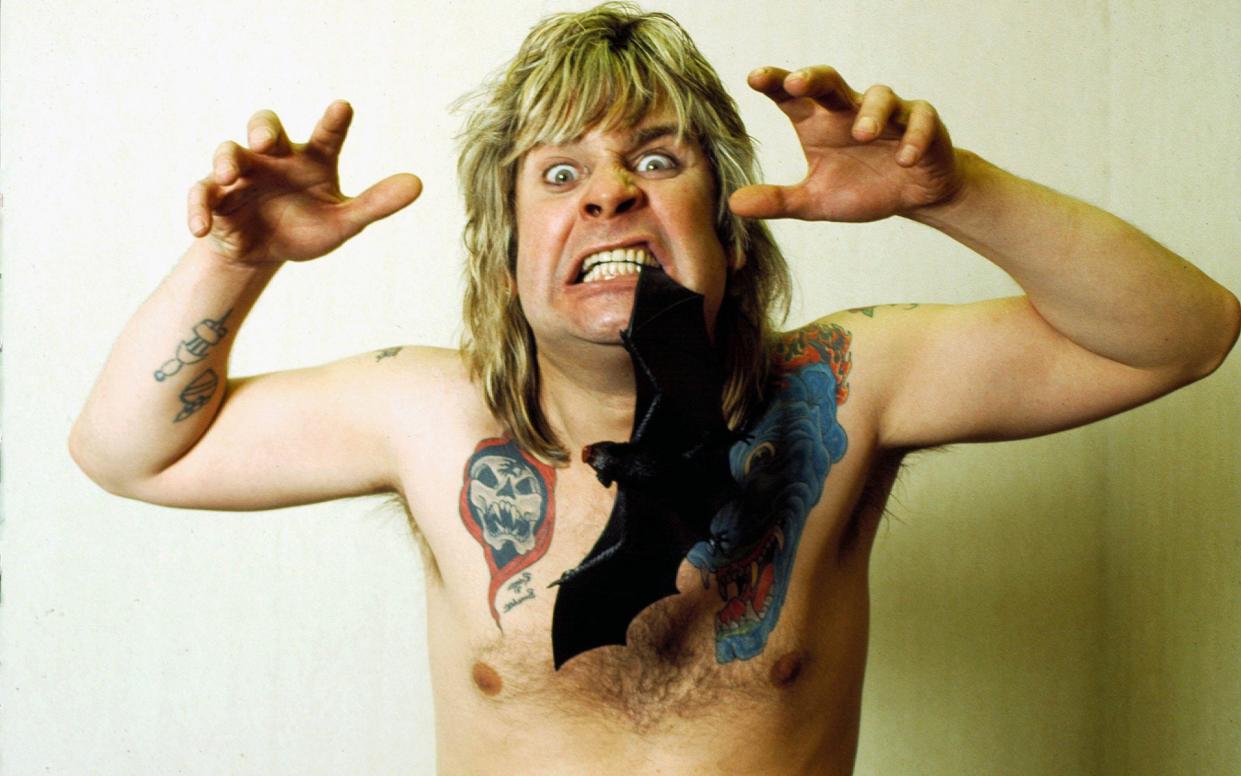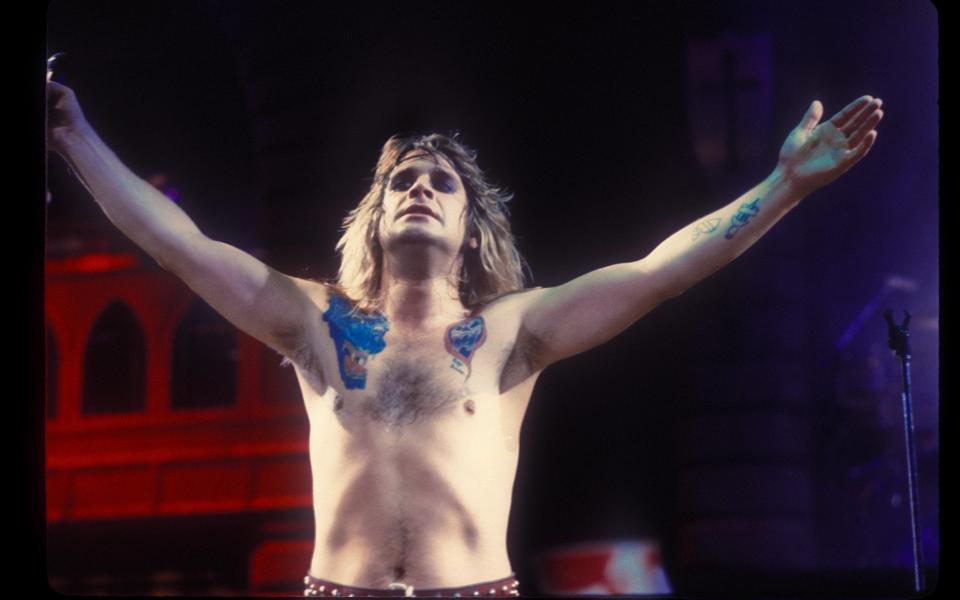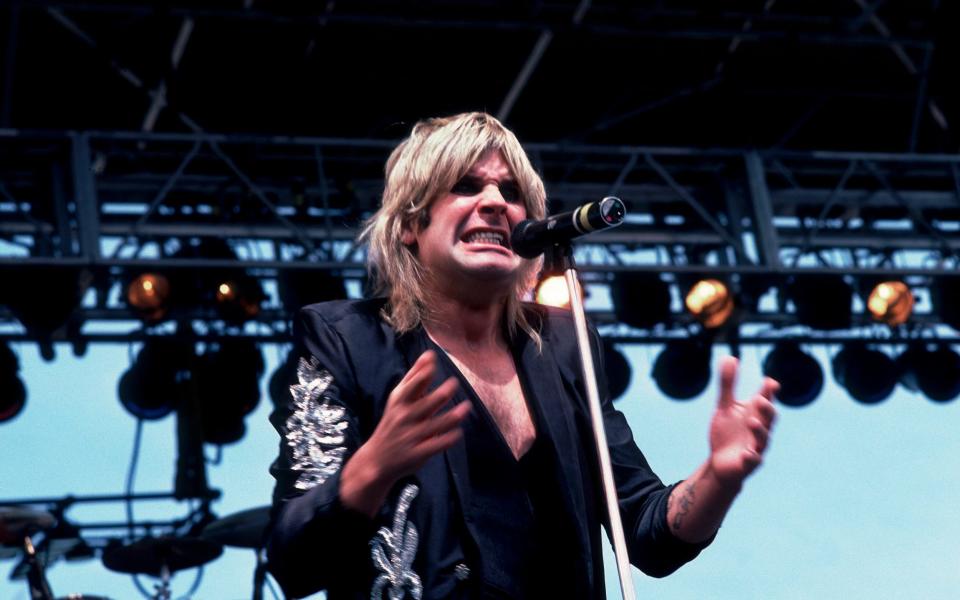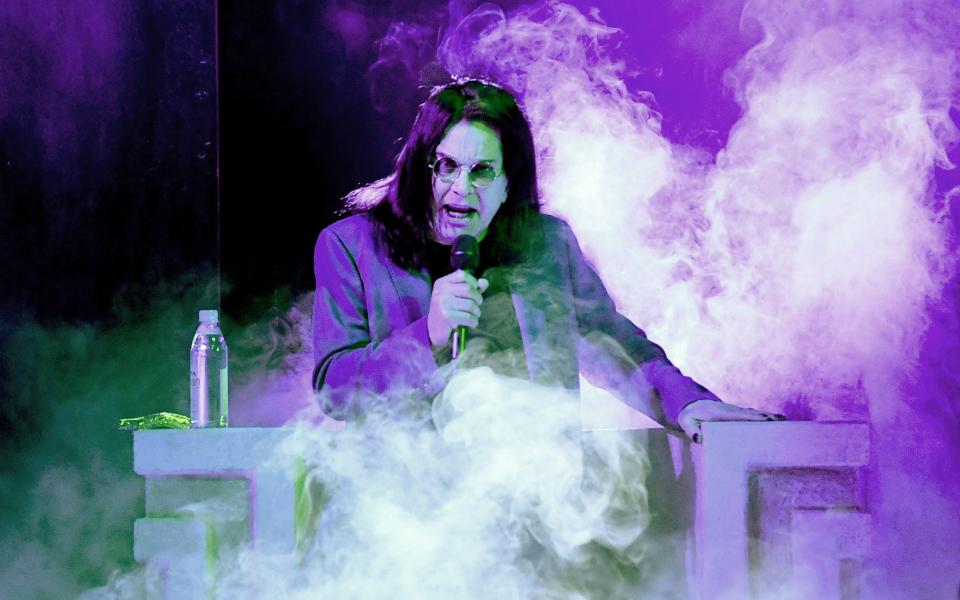‘Ozzy bites head off bat’: the bitter truth about rock’s wildest myth

Ozzy Osbourne’s Diary of a Madman concert tour of 1981-82 was not a production blessed with subtlety. It was an all-guns-blazing heavy metal extravaganza set in a mock gothic castle. It featured flaming torches, medieval balconies, 20-feet-high stained-glass windows and a cameo appearance by a dwarf in a cassock called Ronnie.
The show was also downright bizarre. As it reached its climax, Osbourne would emerge through swirling dry ice on a huge hovering hand. As this hand extended out above the audience, the former Black Sabbath frontman would catapult pig intestines and calves’ livers into the crowd. Fans would reciprocate by throwing their own animal parts on stage. It’s safe to say you wouldn’t get this at a Coldplay concert.
But strange as this offal-based “call and response” was, no one was prepared for what happened at the Veterans Auditorium in Des Moines, Iowa, on the night of 20 January 1982. During this show, Osbourne saw a live bat land on the stage in front of him. The 33-year-old picked the mammal up, placed its head in his mouth, and chomped. The 5,000-strong audience looked on aghast. -
Recalling the incident later, the self-styled Prince of Darkness immediately knew something was “very wrong”. “For a start, my mouth was instantly full of this warm, gloopy liquid, with the worst aftertaste you could ever imagine,” he said. “I could feel it staining my teeth and running down my chin. Then the head in my mouth twitched.”
As soon as the show was over, Osbourne was rushed to the Broadlawns Medical Centre where he was given rabies and tetanus shots. It cost him $500 and he was given four days’ worth of follow-up shots to take.

The incident – which happened 40 years ago this week – made local, national and international news. The Des Moines Register ran a story with the headline: “Rock singer leaves D. M. with bat taste in mouth.” In the article the city’s Mayor, Pete Crivaro, demanded to know if the singer had violated an agreement not to use animals in his act. Meanwhile, the Des Moines Animal Control Unit visited the arena to try to find the decapitated bat’s body.
There was panic in Wisconsin, where Osbourne was due to play a few nights later. Members of the local Humane Society said they would attend the gig to make sure the incident wasn’t repeated (the headline accompanying this story punned that officials were “aflutter” over the situation). The nurse on duty in the Des Moines hospital on the night said “50 per cent” of her job for the following week was fielding calls from journalist and fans from as far as the UK.
The story of “bat-gate” grew and grew. As it did, Osbourne fully co-opted the tale into his image. The sleeve of his 1986 album The Ultimate Sin featured a bat with Osbourne’s head on it, while bat wings appeared on Ozzy merchandise from keyrings to pin badges. In 2004, Rolling Stone magazine named “Ozzy bites head off bat” as rock’s second wildest ever myth (behind the 1969 story that Beatle Paul McCartney had been dead for three years).
Decades on, Osbourne continues to monetise it. In 2019 he launched a £20 fluffy bat toy with a removable head (nice detail: the head was attached using blood-red Velcro). And this month Osbourne jumped on the bandwagon for non-fungible tokens or NFTs -– unique pieces of digital art – with the launch of CryptoBatz. That’s right. So enduring is this yarn from four decades ago that it has entered the none-more-2020s world of blockchains and cryptocurrencies.
Osbourne said last week that he’ll release almost 10,000 CryptoBatz, which fans can buy. They will be held in an owner’s digital wallet and — here’s the Ozzy angle — each CryptoBat will be able to “bite” and mutate with another NFT in their digital wallet, creating a so-called MutantBat. Going further down the virtual rabbit hole, Osbourne will also launch AncientBatz, which is a treasure hunt allowing CryptoBatz holders to track down other secret Batz. If found, these ones will be able to “bite” and breed up to 100 MutantBatz.
“CryptoBatz is a f______ mental project for NFT collectors and fans,” Osbourne said last week, with a degree of understatement. “The design pays tribute to one of my most iconic onstage moments and is a chance to acquire a rare piece of art history. I love it.”
Rarely can such a brief incident involving a small flying mammal have become such a huge part of a singer’s mythology. It’s all the more interesting given that the story grew wings, if you will, despite the truth being somewhat duller than the tale suggests. “Ozzy and the bat” is a brilliantly compelling rock ’n’ roll story. It is also classic case of the myth superseding the reality.
The 17-year-old who threw the bat onto the stage was a fan called Mark Neal. He said after the concert that the animal was, contrary to reports, dead long before Osbourne took to the stage. According to the Des Moines Register, Neal’s younger brother had brought a live bat home from school some days earlier (he’d stolen it from the science department) but the unfortunate creature had died. Knowing of Osbourne’s wild stage show, Neal’s friends had convinced him to put the perished animal in a bag and sneak it into the arena. For his part, Osbourne thought it was a fake bat made from rubber.
Neal himself was worried after the show that lobbing the bat onstage would land him in hot water. And he certainly didn’t like what he saw on the stage. “It really freaked me out,” Neal told a local reporter post-show. “I won’t get in any trouble for admitting this, will I?”

Far from being a gross act of rebellion, then, the bat ended up in Osbourne’s mouth due to a series of schoolboy dares and misunderstandings. And despite his tendency to milk the myth, even Osbourne has admitted it was stupid. A decade after the event, he described in a TV documentary just how painful those rabies jabs were. “I had one in each rear, one in each arm, and one in the top of my leg – and I had to have that every night. For anyone out there who thinks it’s ‘cool’… if you want to be a complete dick, try it,” the singer said. (In a show in Illinois six days after the Des Moines incident, Osbourne collapsed on stage due to illness caused by the shots.)
But none of this matters. What matters is the myth. And it goes to the heart of what rock music has always been about. Danny Goldberg is a music executive who was Led Zeppelin’s PR man in the Seventies and went on to manage Nirvana in the Nineties. “Regardless of the facts — and, yes, myth is more important than reality when it comes to these things — the story that Ozzy bit off the head off a bat added a dark mystique to his persona,” Goldberg tells me. “His career would have still have travelled on a successful arc because of his musical talent and charisma, but the bat story added a unique talking point that reinforced the image he had already created. It’s hard to imagine any summary of Ozzy’s career that wouldn’t include the incident.”
Musicians have to have their shtick, whether it’s Alice Cooper appearing on stage with a snake, Madonna constantly prodding the Catholic church or Jimi Hendrix setting fire to his guitar. A musician does something, that something becomes part of their image, the image becomes part of the marketing, and before you know it, the something and the musician are one and the same.
It could even be something as small as Ed Sheeran’s effects pedal, Adele’s “cor blimey” stage patter or Slash from Guns N’ Roses’ trademark top hat: no concert would be complete without them. “Ozzy and the bat is the same as Alice Cooper and the snake. I’d go so far as to say that biting the bat took Ozzy Osbourne up to a completely new, if rather eccentric, level,” says Nick Stewart, the music manager and label boss who signed U2 to Island Records in 1980.
Pop audiences don’t seem to mind whether a myth, persona or controversy is true or not. They just want to be entertained. When Pope John Paul II said Madonna’s performance of Like A Prayer on her 1990 Blond Ambition tour was “one of the most satanic shows in the history of humanity”, did audiences really believe this? As she performed the song in question, Madonna was surrounded by gyrating dancers dressed as priests and nuns.
But ticket sales of almost 900,000 suggest the crowds simply saw it as a mildly provocative piece of performance art. It was just Madonna being Madonna, or, as Goldberg puts it, a “unique talking point”. Osbourne’s career certainly reached new heights after Des Moines: shortly after his Diary of a Madman tour ended he hit the road again, playing almost 200 shows globally over the next thirty months.
Some commentators dismiss the bat incident as pure vaudeville. Professor Keith Negus, professor of musicology at Goldsmiths University in London, says the bat incident reflected a “big macho posturing period” in music when a particular type of rock star indulged in some excessive behaviour, which was then exaggerated or encouraged by excitable rock writers. “Rock started as rebellion and quickly became pantomime,” he says of the bat story. It’s a compelling argument.

Indeed when looked at through the prism of the pantomime tradition, it could easily be said that the Prince of Darkness is little more than Widow Twankey with a crucifix. Both are larger-than-life stage constructs. Both require suspension of disbelief in the name of entertainment. But, again, this doesn’t matter. It’s all an act, with audiences and Osbourne all in on the joke.
It’s worth pointing out that bats haven’t always been Osbourne’s friends. In 2014, the singer saw plans to convert a barn on his Buckinghamshire estate quashed by Chiltern District Council on the basis that they’d found “considerable evidence” of bats on his grounds. Even rock stars need to be careful what they wish for. The press had a field day.
But, rabies jabs aside, this is the only time the bat incident has come back to bite Osbourne. He has dined out on the tale for decades, whether he has been constructing his persona, choosing his album covers or launching CryptoBatz. According to last year’s Sunday Times Rich List, Osbourne and his wife and manager Sharon have a net worth of £150 million. The myth spun from his gruesome chomp 40 years ago has undoubtedly contributed to this fortune. That foul aftertaste was certainly worth it.
